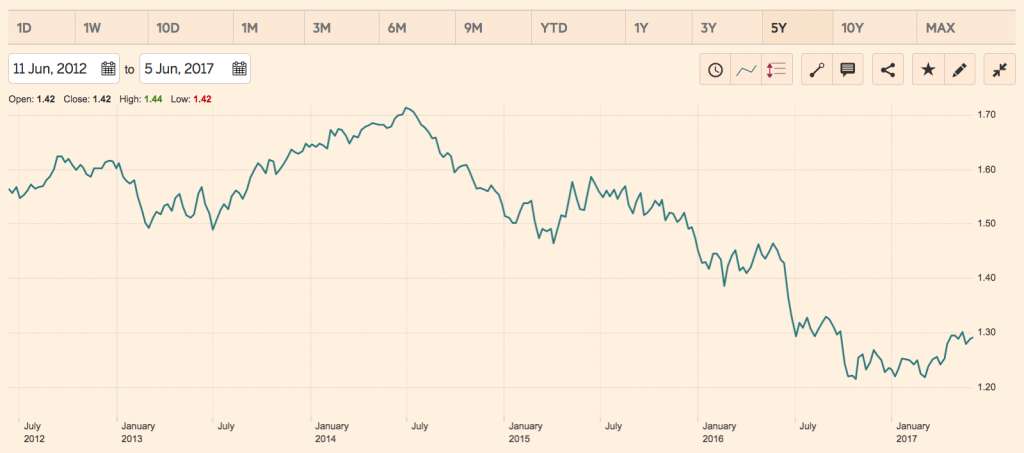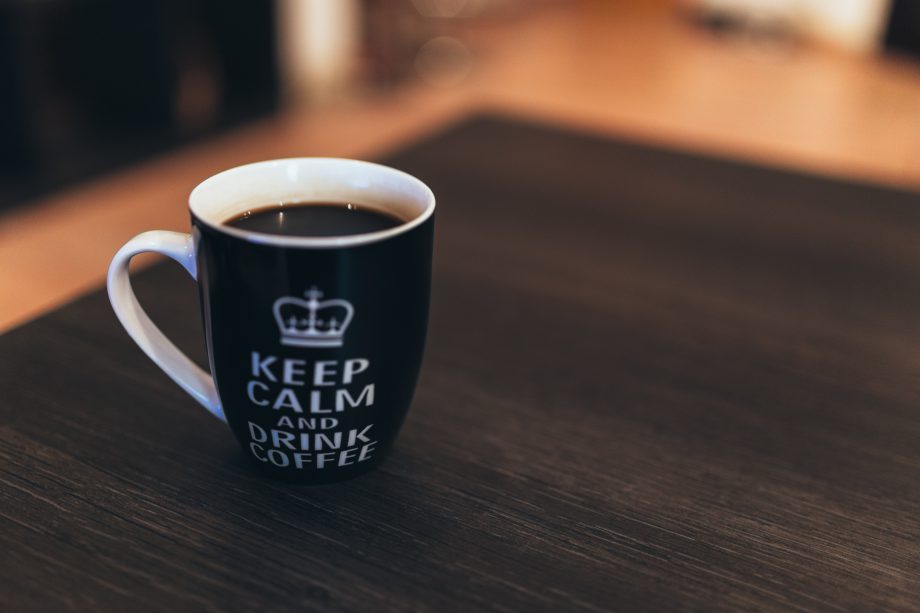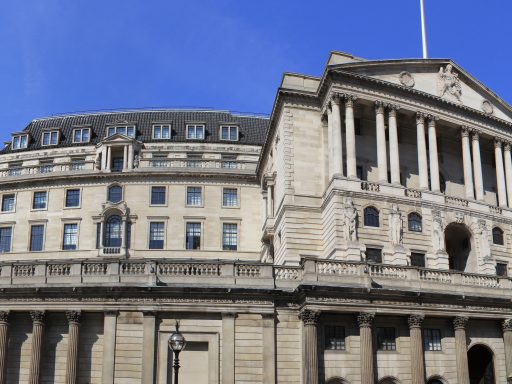What goes up must come down, they say. Either way, there is no reason to panic!
When you put things into a longer context, say five years, you can see that – whatever happens – we’ve probably been there in the past, and will probably be there again in future.
Let’s explore the current situation where we’re seeing a lower pound and rising inflation.
Plummeting pound
Alas! Poor pound. It’s been falling for ages – although it does seem to be making a slight recovery in 2017, as shown on this five-year chart compiled by the FT. (The sudden drop just before July last year was a result of the Brexit referendum vote.)

A weak pound can benefit small businesses who export their goods and services or sell to tourists. The Guardian recently reported the following success stories:
Wrendale Designs of Lincolnshire source nearly all their materials from the UK, and export greetings cards, home furnishings and giftware to the US. Co-founder, Jack Dale predicts 30% growth in turnover this year.
“The US market is doing really well for us,” he says. “We’ve kept our prices constant but obviously the dollars we’re earning convert to around 15% more pounds.”
The Scotch Whisky Experience in Edinburgh has had its busiest year ever, with visitor levels up 9% on last year and the number who take a tour up by 12%.
Julie Trevisan Hunter, head of marketing, says: “The weakness of the pound has made Scotland an attractive holiday destination, particularly for short-haul travellers. At the same time, the value of the pound versus the euro has made staycations more attractive for people from the rest of the UK.”
For fashion brand, Gandys, online international sales are up 21% by volume and nearly 13% in value, while in-store sales in London have seen a 14% boost, largely due to shoppers from overseas.
“We’re doing really well with tourists who are spending a lot more money in our flagship Spitalfields store because they’ve effectively got a 15% discount,” says co-founder, Paul Forka.
International sales have also rocketed for male grooming brand, The Beard and the Wonderful, who sell products online through their own site and via eBay.
Founder, Steve Sanger, says: “Before, around 4/5 of our business was in the UK but now it’s more like a 50/50 split. On lower cost items a 15% discount may only bring your cost down by less than a pound, but it gets you at the top of search results when people prioritise by price.”
Bibby Foreign Exchange allows “hedging” of dollar and euro purchases, where an SME fixes a price a month or two in advance so they know they will have enough in the bank for an upcoming purchase.
MD, Michael McGowan, has seen a sharp rise in SMEs being more comfortable to deal in dollars and euros. Similarly, business is brisk in turning dollars and euros earned abroad back into pounds.
“A few years ago, many British SMEs were resistant to selling in another currency but since the drop in the pound, they’re increasingly willing to deal in euros or dollars,” he says. “You’re effectively getting 15% more margin for the same transaction.”
Soaring inflation
Meanwhile, UK inflation has been rising since 2015. This chart shows the past five years:
Source: tradingeconomics.com
The Bank of England set an inflation target of 2%. However, in April 2017, consumer prices increased 2.7% year-on-year, following a 2.3% rise in each of the previous two months, and inflation is now running at its highest rate since September 2013.
But why?
According to TradingEconomics.com, the upward trend is mainly connected with the reduced value of sterling since the Brexit vote last year, as well as the rising cost of air fares (due to a late Easter), and electricity prices. With a falling pound, imports are more expensive. At the same time, fuel and food prices are rising.
Ben Brettell, senior economist at Hargreaves Lansdown, said: “Transport costs account for more than a third of the inflation figure. Oil is priced in dollars, and sterling has fallen around 13% since last June’s referendum.”
With the average pay rise at 2.3%, and inflation increasing at the same or higher rates, employees are no better off, which puts pressure on household income and spending.
In BBC reports, the Bank of England said it expects inflation will peak at 2.8%, although some economists think it could rise above 3%.
And what does this mean for interest rates?
Suren Thiru, head of economics at the British Chambers of Commerce, said: “Businesses continue to report that the substantial increases in the cost of raw materials and other overheads over the past year are still filtering through the supply chain, and are therefore likely to lift consumer prices higher in the coming months. However, it remains probable that the current period of above target inflation is transitory in nature, with little evidence that higher price growth is becoming entrenched in higher pay growth. This should give the Bank of England sufficient scope to keep interest rates on hold for some time yet, despite their recent warning.”
Interest rate increases by the Bank of England are uncertain, particularly in relation to controlling prices.
Which means that – if your business has money in the bank – you have to do your best to make the most of it. And that means using your Akoni Hub to find the account paying the best interest on your cash deposits. We also provide a personalised report with best practice relating to cash management, collecting funds owed to you and paying your suppliers.
After that, you can put your feet up, relax, and have a cup of coffee.
Akoni helps businesses make the most of their cash. Register for free at AkoniHub.com







